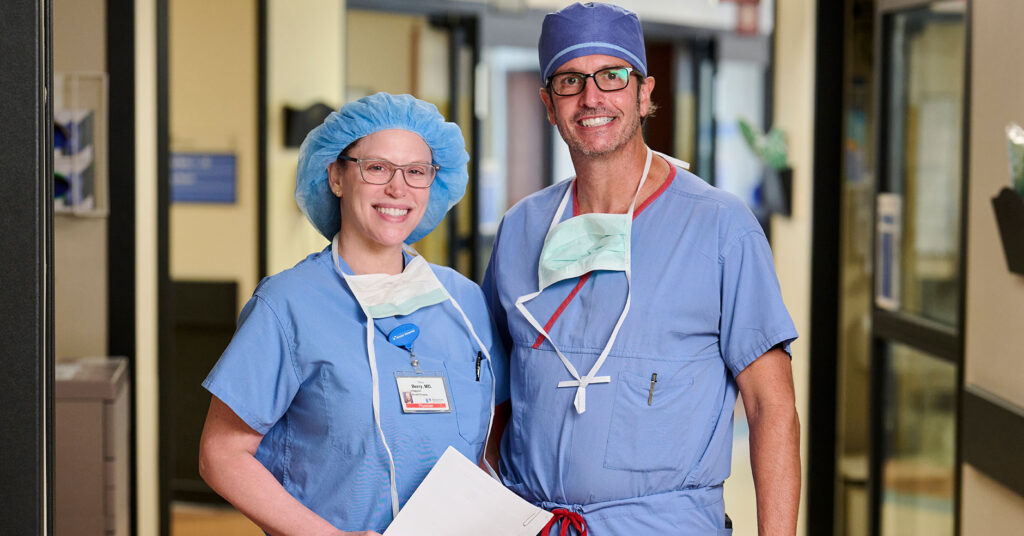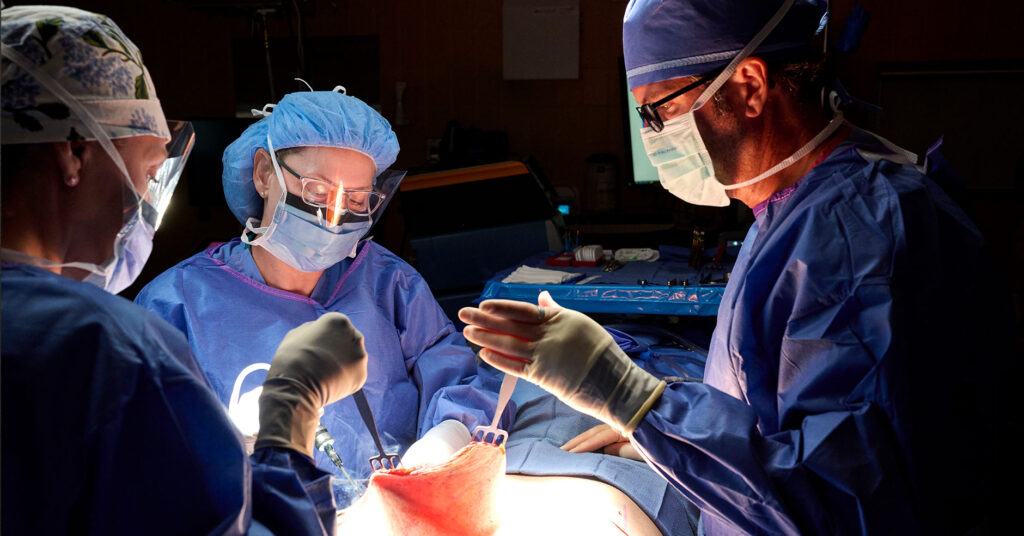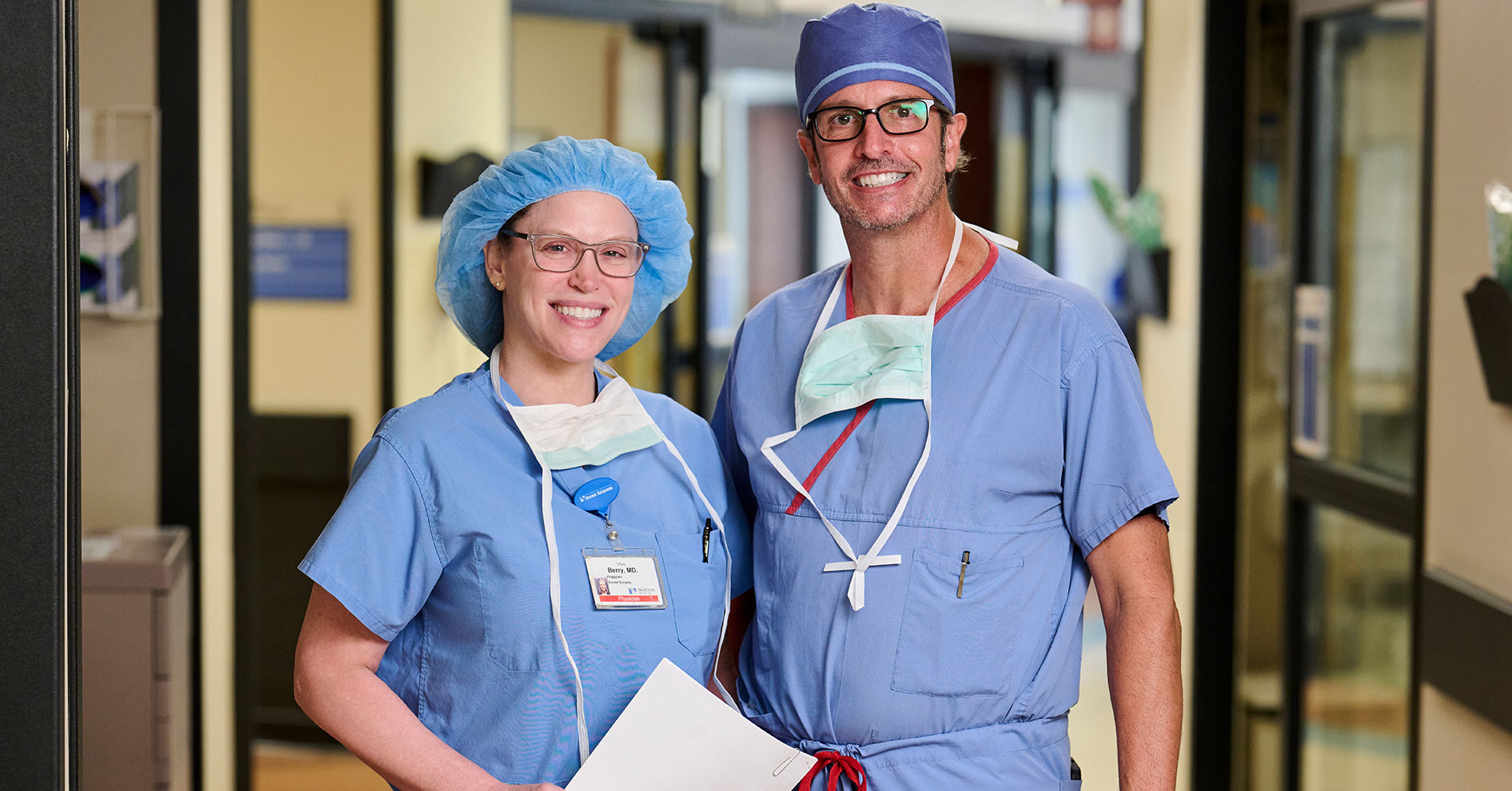At Norton Healthcare, Tiffany Berry, MD, and Brian Thornton, MD, are leading breast cancer surgery through multidisciplinary integration
LOUISVILLE Breast cancer care has advanced rapidly over the past two decades, with modern treatment increasingly defined by multidisciplinary coordination, individualized planning, and cutting-edge surgical techniques. At Norton Cancer Institute, two physicians exemplify this integrated model: Tiffany Berry, MD, a breast surgeon who directs the Prospective Breast Health Program, and Brian Thornton, MD, a reconstructive surgeon specializing exclusively in breast restoration. As the medical director of the Prospective Breast Health Program at Norton Healthcare’s downtown campus, Berry oversees an integrated approach that guides patients from diagnosis to survivorship. “We have a highly integrated team all the way from the diagnosis with radiology through survivorship,” she says. “I think that’s something that patients really pick up on.”
Called to Cancer Care
After attending the University of Alabama on a swimming scholarship, Berry returned to her hometown of New Orleans for medical

school at Louisiana State University School of Medicine, where her interest in oncology took root. During her general surgery residency at the University of Kentucky, Berry undertook a “mini breast fellowship” in her second year. “I found that to be very rewarding, taking care of a population, mostly made of women and helping them in a very tumultuous, emotionally rocky time.” She went on to complete a breast surgery fellowship at the Cleveland Clinic, training exclusively in breast surgical oncology.
Berry joined Norton Healthcare in October 2010, initially directing the entire breast program across multiple hospital sites. She led the system to NAPBC accreditation, later focusing her leadership on the downtown campus. Berry sees a wide spectrum of patients— most women, but about 1% men—with ages ranging from their 30s to their 80s. She has observed a rising rate of breast cancer in younger women. “We have seen, per the data, that there is a rising population in the younger women. We’re not exactly sure why that’s happening. I assume it’s something environmental, something we’re eating, something that’s outside of what we understand at this time.”
Risk factor counseling is a key component of her practice. She regularly addresses smoking cessation and obesity, noting that “In breast cancer specifically, up to 20% of breast cancers are related to obesity.” These factors influence not only cancer risk but also surgical outcomes and recovery. She is also a huge proponent of screening accessibility: “Women need to be screened. Early detection is the name of the game.”
Technology Is Shifting the Treatment Paradigm
In her role, Berry often serves as the first physician to outline a treatment plan. “We know from studies that the level of anxiety is extremely high for patients until they get to the point where they have a plan,” she explains. Whether the path begins with surgery or systemic therapy, she values the multidisciplinary clinic where surgical, medical, and radiation oncologists align on a strategy the same day.
Technological and procedural advances have shaped her 15 years in practice. She has witnessed the “de-escalation of surgery” with fewer complete lymph node removals, increased use of genomic testing to guide chemotherapy, and new localization techniques that eliminate the need for wire placement before surgery. Looking forward, she envisions preventative vaccines and even genetic interventions as potential game-changers in breast cancer care.
According to Berry, “As far as advances go, I think there’s data that shows we can do less surgery with the same outcomes for cancer. There are studies that even talk about avoiding surgery altogether. I’ve always predicted that, by the end of my career, we wouldn’t be doing breast surgery on the majority of patients anymore.”
But, for now, Berry’s operative schedule is steady—two days in the operating room and two in clinic—allowing her to maintain family balance. Far from feeling depleted by oncology work, she says, “It actually feels like this is where I’m supposed to be. And when you are in the place where you’re supposed to be, you don’t get drained by your work, but rather energized by your work.”
For Berry, the mission is clear: “Our job as surgeons and providers is to try to not only treat the cancer, but to restore the most normalcy that we can for a woman and get her back to the life that she expected to lead.”
The Role of Reconstruction
In Norton Healthcare’s model, surgical oncology and reconstructive surgery operate in tandem, giving patients the opportunity to make informed choices about their reconstruction timeline and options from the very start. This seamless hand-off between cancer treatment and restoration is where the expertise of Brian Thornton, MD, Director of Breast Restoration, plays a vital role.
Thornton built his career around a singular mission—providing specialized, long-term reconstructive care for breast cancer patients. His path to becoming one of the most sought-after reconstructive surgeons in the region began far from the operating theater. “I developed an interest in medicine very early on,” Thornton recalls. “I grew up on a working family farm in Paris, Kentucky, and that was not what I wanted to do for a living. I always geared towards medicine or being a chef, for some reason.” The culinary industry’s loss is the medical field’s gain.
After earning his undergraduate degree at the University of Louisville, Thornton pursued a PhD and later a medical degree at the same institution. He completed his integrated residency program at the University of Kentucky, returning to Louisville to begin practice in 2005. A few years later, he furthered his leadership and administrative knowledge by earning an MBA from the University of Louisville in 2008.
Committed to Complex Cases
Though initially drawn to cosmetic surgery, Thornton quickly realized that his passion lay in helping patients through the physically and emotionally complex process of breast reconstruction. “I’ve always had an interest in taking care of patients. I enjoyed cosmetic surgery but—with all due respect—never felt like I was really helping patients in a way that I wanted to help. I really fell in love with helping breast cancer patients and their special needs.”
Unlike plastic surgeons who shift towards lucrative cosmetic procedures, Thornton chose to remain focused on breast reconstruction. “I stuck with it and I got better at it. I was committed in my practice to the breast cancer patients and their needs. I just kept getting more and more referrals. I’m not that special, it was just you won’t find too many people that just have spent their life doing a limited number of surgeries in the breast, and dealing with breast cancer patients, and that turned out to be me.”
Thornton treats a wide age range of patients, from as young as 21 to those in their 80s. Some have newly diagnosed breast cancer, while others require revisions or maintenance decades after their original surgeries. “Cancer is a forever event, but so is reconstruction to some degree,” he notes. In 2024, after nearly two decades in private practice, Thornton officially joined Norton Healthcare. In reality he had been closely

integrated with their breast care model for years—attending breast conferences, collaborating with surgeons, and operating on their patients.
Reducing Risks and Optimizing Outcomes
Patient selection is at the heart of Thornton’s reconstructive approach, particularly when working with higher-risk populations. According to Thornton, “From the reconstructive side, the challenge of unhealthiness, especially smoking and obesity, really leads to a high risk of complications associated with breast reconstruction. Mitigating those risks, making sure every woman is afforded the opportunity for breast reconstruction, is very important to me. It is my job to decide how we mitigate their risk and achieve those goals.” One way Thornton mitigates risk is by insisting that all patients stop smoking for at least four weeks before and four weeks after surgery.
He also spends considerable time educating patients. “I’ve developed what I call the ‘song and dance’ to patients about breast reconstruction. I really try to come in and offload all the cancer stuff from the patient. Then the first thing we talk about is when to do the reconstruction. Some patients opt to undergo reconstruction immediately, while for others it is ideal to wait four to six months,” Thornton says.
Current and Coming Techniques
Implant-based reconstruction remains his primary method, representing roughly 80% of all breast reconstructions in the United States. “The remaining 20% is where a tissue can be taken from anywhere on the patient’s body and used to refill the breast, which is an amazing surgery, but very complex,” he says. Louisville currently lacks surgeons to perform these microsurgical procedures, though Norton Healthcare is recruiting to meet this need. Nipple-sparing mastectomy is another priority for Thornton, when clinically appropriate. “It is much more like a breast when a woman can maintain her nipple.”
In addition, patients now have access to new silicone implant options that expand what is possible in reconstruction. Traditional silicone implants are preferred over saline for their natural feel, appearance, softness, and durability, but until recently, women requiring very large volumes were limited to saline devices. With FDA approval, a new generation of large-volume silicone implants, the Mentor™ Memory Gel Enhance Breast Implant—ranging from 930 to over 1,400 ccs—has become available, meeting the needs of heavier patients undergoing mastectomy who previously had no ideal option.
As the field of breast reconstruction evolves, Thornton remains steadfast in his focus to give women comfort and confidence. His dedication has built a reputation for both technical expertise and unwavering commitment to a vulnerable patient population. The integration of Berry’s precision in oncological surgery with Thornton’s dedication to specialized reconstruction underscores a shared vision: comprehensive breast cancer care that restores health, confidence, and normalcy. Their combined approach reflects the evolving standard in oncology—where survival is just the starting point, and the ultimate goal is a life fully reclaimed




